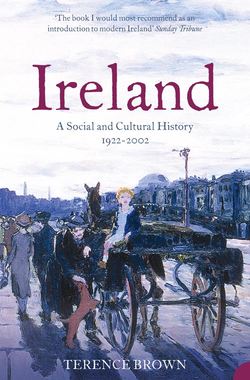Ireland: A Social and Cultural History 1922–2001

Реклама. ООО «ЛитРес», ИНН: 7719571260.
Оглавление
Dr. Brown Terence. Ireland: A Social and Cultural History 1922–2001
IRELAND
Terence Brown
Table of Contents
Preface to the Second Edition
Preface
PART I
CHAPTER 1. After the Revolution:Conservatism and Continuity
CHAPTER 2. An Irish Ireland:Language and Literature
CHAPTER 3. Images and Realities
CHAPTER 4. The Fate of the Irish Left and of the Protestant Minority
CHAPTER 5. The 1930s: A Self-Sufficient Ireland?
CHAPTER 6 “The Emergency”: A Watershed. I
II
III
CHAPTER 7. Stagnation and Crisis. I
II
CHAPTER 8. Economic Revival
CHAPTER 9. Decades of Debate. I
II
III
CHAPTER 10. Culture and a Changing Society
II
CHAPTER 11. The Uncertain 1980s. I
II
III
IV
V
VI
CHAPTER 12. Revelations and Recovery. I
II
III
IV
V
CHAPTER 13. Conclusion: Culture and Memory in an International Context. I
II
III
IV
V
VI
VII
Acknowledgements
Notes and References. Chapter 1: After the Revolution
Chapter 2: An Irish Ireland
Chapter 3: Images and Realities
Chapter 4: The Fate of the Irish Left and of the Protestant Minority
Chapter 5: The 1930s
Chapter 6: “The Emergency”
Chapter 7: Stagnation and Crisis
Chapter 8: Economic Revival
Chapter 9: Decades of Debate
Chapter 10: Culture and a Changing Society
Chapter 11: The Uncertain 1980s
Chapter 12: Revelations and Recovery
Chapter 13: Conclusion: Culture and Memory in an International Context
Index
About the Author. IRELAND
Copyright
About the Publisher
Отрывок из книги
A Social and Cultural History 1922–2002
Title Page
.....
The upper-class Ralph O’Brien also finds himself socially ill at ease in a church that appears to be dominated by the acquisitive prudery of farmer and shopkeeper. Both Father Ralph and a later O’Donovan novel, Vocations (1921), describe a social order in which church, farmer, grocer, and gombeen publican comprise a corrupt and corrupting alliance, intent on social advancement.
O’Donovan, a supporter of the Irish cooperative movement founded by Sir Horace Plunkett, and keenly interested in rural renewal, presents the church as an institution dedicated neither to spirituality nor the intellectual enhancement of the faith, but to material and social advantage. Other much less tendentious commentators suggest that his portrait of Maynooth as intellectually deficient and the church as lacking a constructive social vision was not wholly unfounded. Canon Sheehan, the priestly novelist and a really sympathetic observer of Irish ecclesiastical life, remembered in an unfinished manuscript his own days at Maynooth in the 1870s, where he was distressed by a prevailing careerism evident in such current phrases as “respectable position in the Church,” “high and well-merited dignities,” “right of promotion,” “getting a better parish,” “a poor living,” concluding:
.....